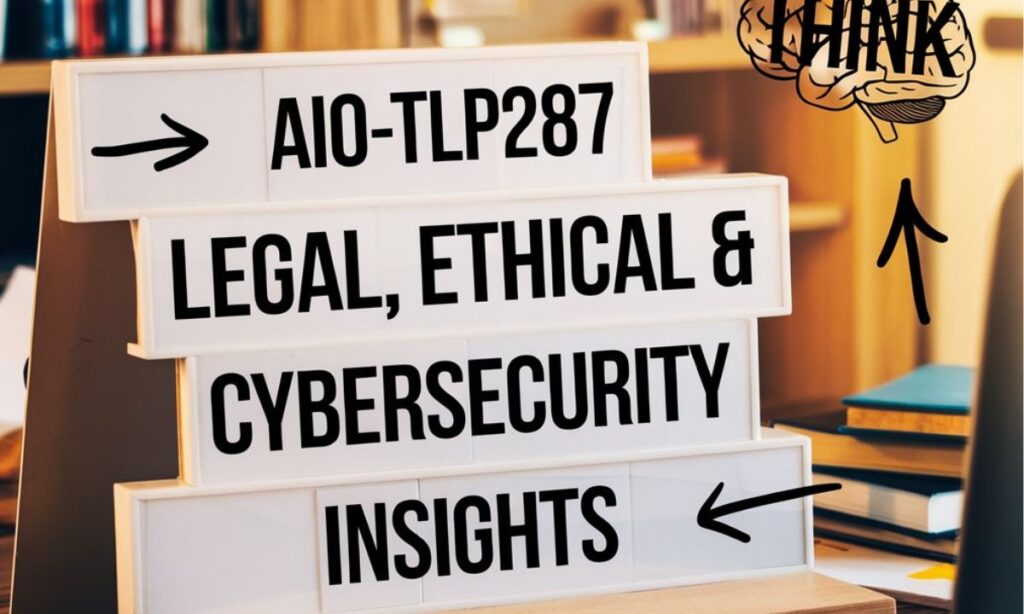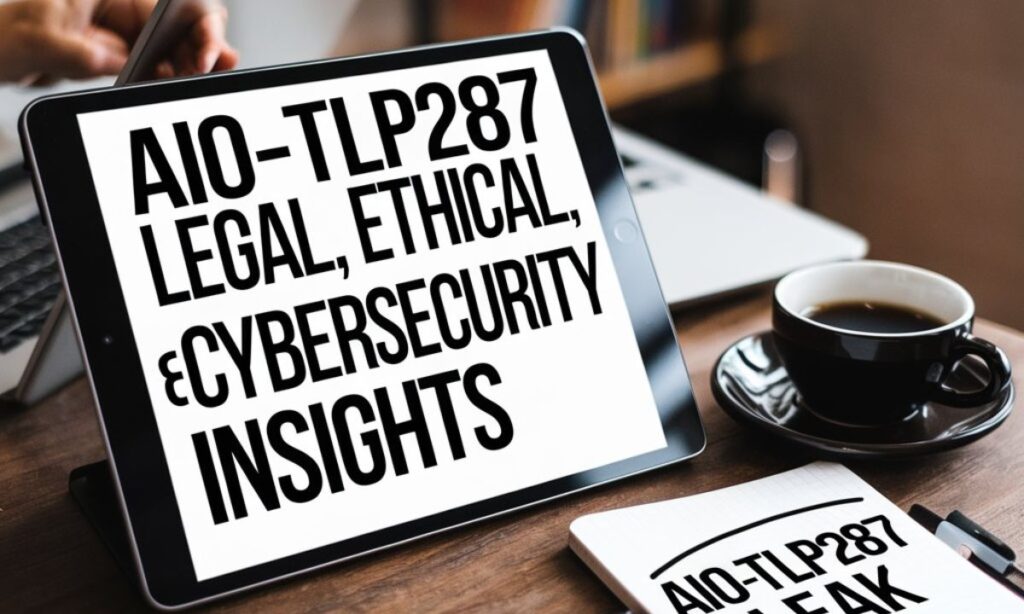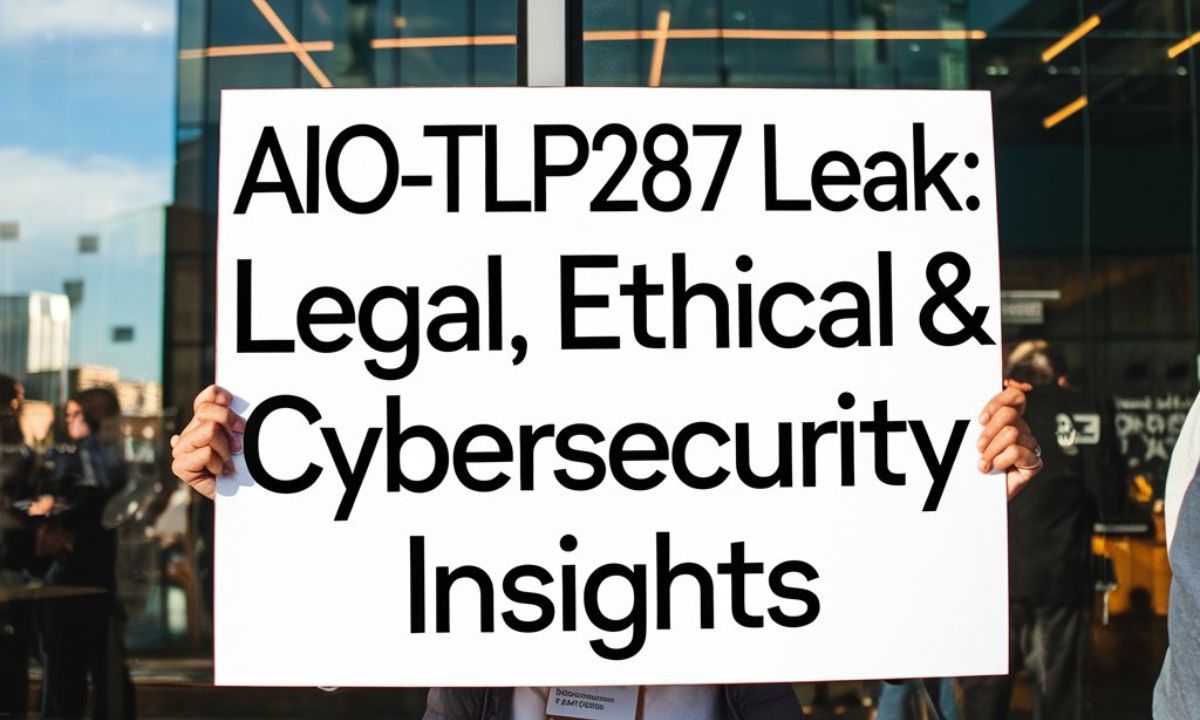Data breaches have become increasingly common, raising significant legal and ethical questions. The AIO-TLP287 leak highlights the complexities surrounding data protection, cybersecurity, and ethical considerations in the digital age. This article explores the legal consequences, ethical dilemmas, the role of dark web marketplaces, and strategies to mitigate risks associated with such breaches.
Understanding the Legal Consequences of the AIO-TLP287 Leak
1. Violations of Data Protection Laws
Data protection laws are designed to safeguard personal information. The AIO-TLP287 leak potentially violated several regulations, including the GDPR and CCPA. Organizations must ensure compliance with these laws to avoid severe penalties.
- GDPR (General Data Protection Regulation) imposes strict rules on data handling within the EU. Non-compliance can lead to fines up to 4% of annual global revenue, severely impacting organizations financially.
- CCPA (California Consumer Privacy Act) offers California residents rights regarding their personal data. Organizations failing to comply may face lawsuits and fines, which can escalate quickly, leading to significant financial and reputational damage.
2. Legal Consequences for Hackers & Data Distributors
Hackers involved in data breaches face significant legal repercussions. Cybercrime laws categorically define penalties for unauthorized access and distribution of sensitive data.
- Cybercrime penalties can include hefty fines and prison sentences, depending on the severity of the breach. For instance, the Computer Fraud and Abuse Act (CFAA) in the U.S. outlines various penalties for different levels of cyber offenses.
- Litigation against data distributors can result in civil lawsuits, further complicating their legal standing. Victims of data breaches often seek restitution, leading to costly legal battles for those involved in the distribution of stolen data.
| Consequence Type | Description | Potential Penalty |
| Criminal Charges | Prosecution under cybercrime laws | Fines, imprisonment |
| Civil Lawsuits | Lawsuits from affected individuals or entities | Monetary damages |
| Regulatory Penalties | Fines from regulatory bodies for non-compliance | Significant financial penalties |
Ethical Considerations: White Hat vs. Black Hat Perspectives
1. The Role of Ethical Hackers
Ethical hackers, or white hat hackers, play a crucial role in cybersecurity. They identify vulnerabilities and help organizations strengthen their defenses. Their actions are legally and ethically justified, contrasting sharply with black hat hackers who exploit data for malicious purposes.
- Responsible disclosure policies guide ethical hackers in reporting security flaws safely. These policies encourage collaboration between companies and hackers to improve security without exposing vulnerabilities to malicious actors.
- Their contributions enhance data protection and contribute to overall cybersecurity efforts. Organizations that engage with ethical hackers can significantly reduce their risk of falling victim to data breaches.
2. The Dilemma of Whistleblowers & Data Transparency
Whistleblowers often face complex ethical dilemmas regarding data transparency. While they may expose wrongdoing, they risk their careers and legal consequences.
- The tension between information transparency and security is a significant concern. Whistleblowers must navigate the fine line between protecting sensitive data and advocating for public interest.
- Balancing public interest with corporate confidentiality remains a challenge for whistleblowers. The ethical implications of their disclosures can lead to varying consequences, both for the whistleblowers themselves and the organizations involved.
| Aspect | Ethical Hackers | Whistleblowers |
| Motivation | Improve security | Expose unethical practices |
| Legal Implications | Generally protected | Risk of retaliation |
| Impact on Organizations | Positive (enhances security) | Can lead to significant changes |
The Role of Dark Web Marketplaces in Spreading Leaked Data

1. How Data Leaks Enter Dark Web Marketplaces
The dark web serves as a marketplace for stolen data. Once breaches occur, sensitive information often finds its way to these underground platforms.
- Cybercriminals utilize hacking forums to distribute stolen credentials and financial data. These forums provide a network for criminals to connect, share techniques, and monetize their stolen data.
- Leaked data can be sold or traded among criminals, perpetuating identity theft and fraud. The anonymity of the dark web complicates law enforcement efforts, making it challenging to track and prosecute offenders.
2. Who Profits from Leaked Data?
Various actors profit from leaked data, including hackers, identity thieves, and organized crime groups. The financial implications of these breaches extend beyond immediate monetary gains.
- Stolen financial data sales can lead to significant revenue for cybercriminals. This marketplace thrives on the demand for personal and financial information, creating a cycle of crime that is hard to break.
- The cycle of black market cyber transactions contributes to broader economic issues related to cybersecurity. As cybercrime becomes more profitable, it incentivizes further breaches and data leaks, creating a persistent threat to digital security.
| Profit Source | Description | Impact |
| Cybercriminals | Sell stolen data on dark web marketplaces | Financial gain |
| Organized Crime Groups | Use data for larger criminal enterprises | Amplified crime activities |
| Individual Hackers | Profit from smaller-scale breaches | Increased individual criminal activities |
Mitigating Legal & Ethical Risks: What Can Be Done?
For Governments & Regulators
Governments must establish robust frameworks to combat data breaches effectively. This includes creating laws that are adaptable to technological advancements.
- International cyber law enforcement is crucial in addressing cross-border data breaches. Collaborative efforts among nations can enhance the effectiveness of cyber laws and improve data protection globally.
- Governments should collaborate to enhance data protection compliance globally. By sharing best practices and resources, countries can create a more secure digital environment.
For Businesses & Organizations
Businesses need to prioritize data security to mitigate legal risks. Implementing strong cybersecurity measures is essential.
- Data encryption and multi-factor authentication are critical in preventing breaches. These technologies safeguard sensitive information and create additional layers of security.
- Regular risk assessments can help organizations identify vulnerabilities before they are exploited. By proactively addressing potential weaknesses, organizations can significantly reduce their exposure to data breaches.
For Individuals
Individuals play a vital role in their own data protection. Awareness and proactive measures can reduce risks.
- Cyber awareness training can empower individuals to recognize phishing attempts and secure their information. Understanding common tactics used by cybercriminals is key to personal cybersecurity.
- Utilizing AI-driven threat detection tools can help monitor potential breaches effectively. These tools can analyze user behavior and detect anomalies, providing alerts before a breach occurs.
| Group | Recommended Actions |
| Governments | Establish international laws & cooperation |
| Businesses | Implement robust security measures |
| Individuals | Engage in cybersecurity awareness and training |
The Importance of Data Privacy Regulations
Data privacy regulations play a crucial role in protecting individuals and organizations from the consequences of data breaches. Effective regulations not only impose penalties for non-compliance but also create a framework for data handling that prioritizes user privacy.
The Role of GDPR and CCPA
The GDPR and CCPA serve as foundational laws for data protection. These regulations empower individuals by granting them rights over their personal data.
- Under GDPR, individuals have the right to access their data, request corrections, and demand deletion. This regulation emphasizes transparency and accountability.
- CCPA allows California residents to know what personal data is collected and how it is used, giving them control over their information. Companies must disclose their data practices and provide opt-out options for data sales.
Compliance Challenges for Organizations
While regulations like GDPR and CCPA aim to protect consumers, compliance can be challenging for organizations.
- Organizations must invest in robust data management systems to ensure compliance. This includes training employees on data handling best practices and implementing secure technologies.
- Failure to comply with data protection laws can result in severe penalties. Companies must be proactive in their compliance efforts to avoid legal repercussions and maintain consumer trust.
| Regulation | Key Features | Compliance Challenges |
| GDPR | Rights to access, correction, and deletion | Complex compliance requirements |
| CCPA | Transparency in data collection and usage | Implementation costs |
Final Thoughts: Striking a Balance Between Security & Ethics
The implications of the AIO-TLP287 leak reflect broader issues in today’s digital landscape. Striking a balance between security and ethics is crucial for all stakeholders involved. As the threat of data breaches continues to rise, understanding the legal and ethical frameworks will be essential in navigating these complex issues.
In conclusion, addressing the legal consequences and ethical considerations of data breaches is a multifaceted challenge. Organizations, governments, and individuals must work collaboratively to foster a culture of responsibility and transparency in data handling. Embracing ethical practices while ensuring robust security measures can help mitigate the risks associated with data breaches.

Frequently Asked Questions (FAQs)
What is the AIO-TLP287 leak?
The AIO-TLP287 leak refers to a significant data breach that exposed sensitive information, raising legal and ethical concerns.
What are the legal consequences of data breaches?
Legal consequences can include fines, imprisonment for hackers, and civil lawsuits for organizations that fail to protect data.
How do ethical hackers contribute to cybersecurity?
Ethical hackers identify vulnerabilities and help organizations improve their security measures, contributing positively to cybersecurity.
What role does the dark web play in data breaches?
The dark web serves as a marketplace for stolen data, where cybercriminals can buy and sell sensitive information.
How can organizations mitigate the risks of data breaches?
Organizations can implement strong cybersecurity measures, conduct regular risk assessments, and ensure compliance with data protection laws.
Are there protections for whistleblowers?
Yes, whistleblowers may be protected under various laws, but they often face significant risks when exposing wrongdoing.
What is the importance of data encryption?
Data encryption is crucial for protecting sensitive information from unauthorized access and potential breaches.
By understanding the legal and ethical implications of data breaches, stakeholders can better navigate the complexities of cybersecurity and protect sensitive information in an increasingly digital world. The ongoing dialogue around data protection, ethical hacking, and regulatory compliance will shape the future of cybersecurity, making it imperative for all parties to stay informed and engaged.
Read more informationhttps://verbvictories.online/
Visit my other websitehttps://techyspirtz.com/

I am David a content writer and seo expert with 2years experinces. I have Already BBC News Website.












